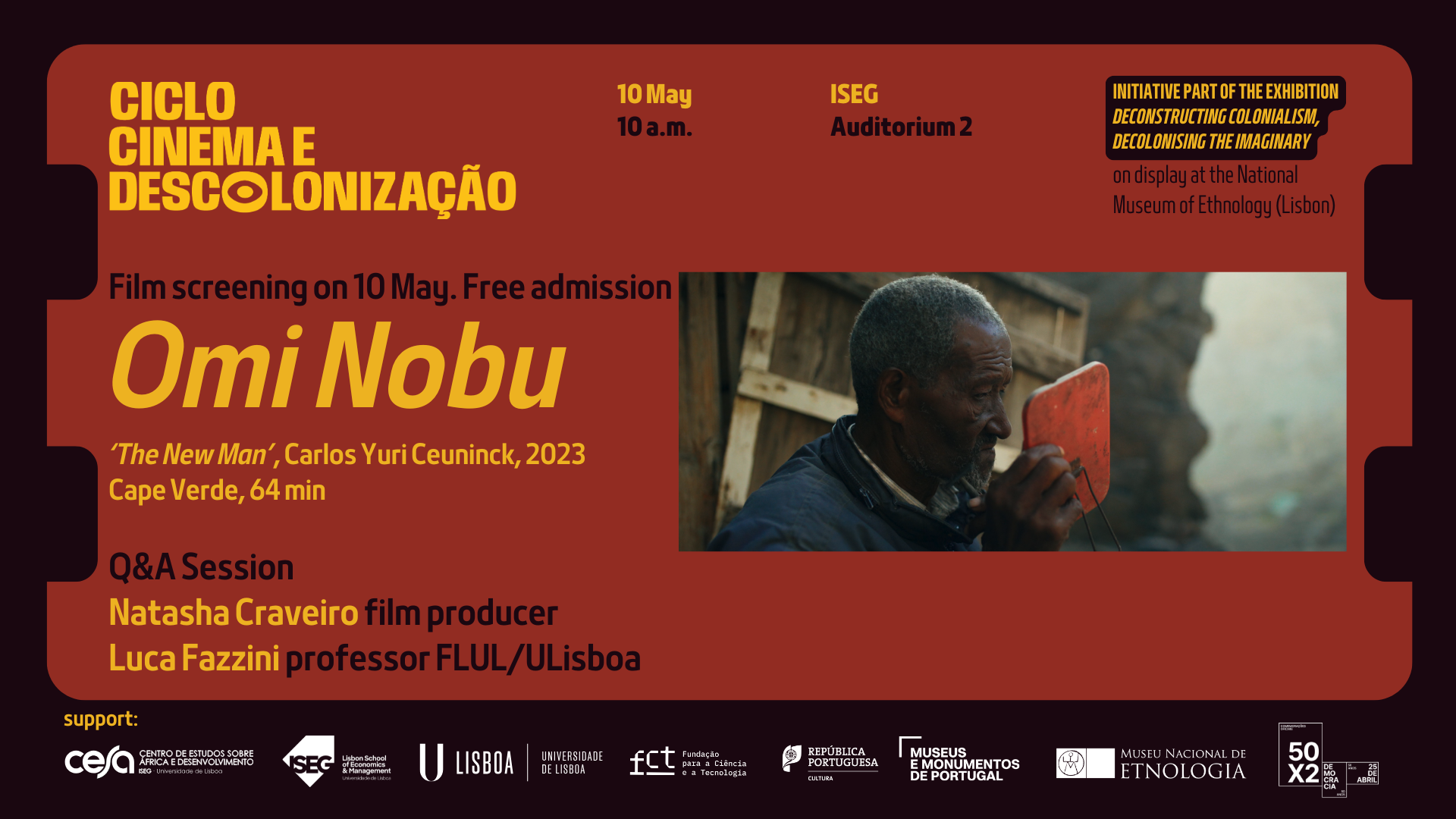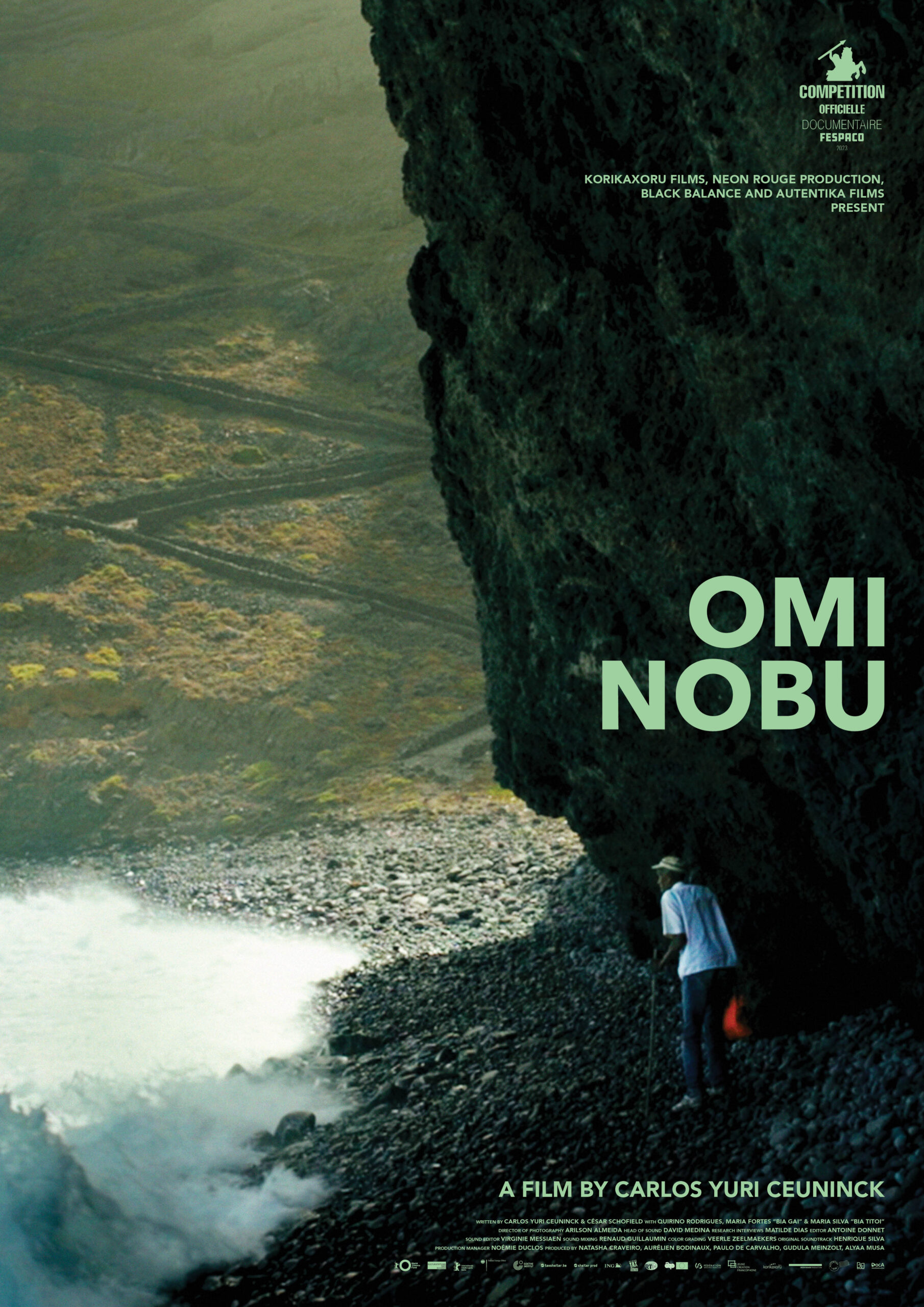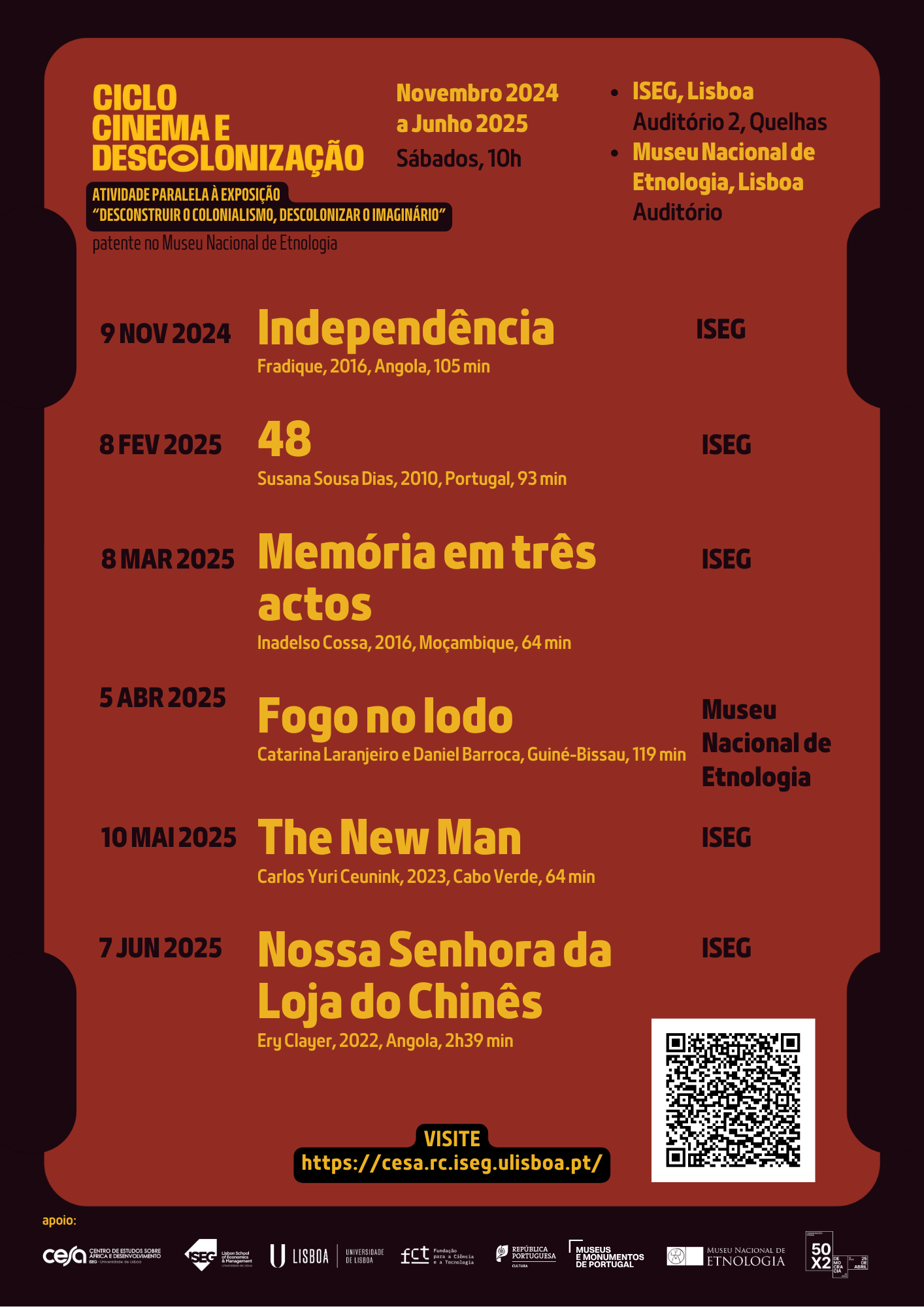May session of the Cinema and Decolonisation Cycle to screen the documentary ‘Omi Nobu’ (‘The New Man’) at ISEG with free admission

The 2024/2025 season of the Cinema and Decolonisation Cycle has been running since November 2024, hosting cineclub-style sessions to explore the legacies and memories of decolonisation. The next session, scheduled for 10 May, will feature a screening of the documentary Omi Nobu (‘The New Man’, Carlos Yuri Ceuninck, 2023, Cape Verde, 64 min), which was selected for FESPACO 2023 in Ouagadougou, where it won the most prestigious award in the documentary competition, the Golden Standard.
The film will be shown at 10:00 a.m. in the Auditorium 2 of the ISEG (Rua do Quelhas 6, Quelhas Building, 2nd Floor), with free admission. Following the film screening, a Q&A session will take place with the participation of Natasha Craveiro, sociologist, film director, and producer of Omi Nobu, and Luca Fazzini, professor at the Faculdade de Letras da Universidade de Lisboa.
Synopsis – Omi Nobu (The New Man) (Carlos Yuri Ceuninck, 2023, Cape Verde, 64 min)
Omi Nobu explores Man’s intimate relationship with Time; the contrast between the frozen time of an abandoned village and that of man confronts us with our own mortal condition. Quirino’s story is also a confrontation between tradition and modernity, between Man’s attachment to the Earth and his relationship with Nature. The story takes place on the island of Sao Nicolau in Cabo Verde, in Ribeira Funda, a small village located at the bottom of a deep valley surrounded by high mountains and a rough ocean. Its inhabitants have experienced such a series of disastrous events that frightening superstitions have led them to flee the village to escape the forces of evil. Everyone left the village to settle in the nearby Estância de Brás. All except one. One man remained: Quirino.
For over thirty years, 77-year-old Quirino has been the sole inhabitant of Ribeira Funda, the ghost village. He has survived for decades by fishing and growing vegetables. He spends his days contemplating the ocean and the majestic mountains that surround his home. His only company is a rooster, a few sparrows and a battery-powered portable radio, which hums with news from the rest of the world. But in the twilight of his life, Quirino, faced with an uncertain future and the harassing weight of isolation, illness and old age, resolves to leave the only place he has ever known. Omi Nobu takes us on a journey through the days and nights of the past, present and future of a village, a land and a man, and, in fine, meditates on our ontological relationship with the finitude of time and space.
Credits
Director: Carlos Yuri Ceuninck
Producers: Natasha Craveiro and Aurélien Bodinaux
Co-Producers: Paulo de Carvalho / Gudula Meinzolt / Alyaa Musa
Written by Carlos Yuri Ceuninck and César Schofield
Director of Photography: Arilson Almeida
Head of Sound: David Medina
Editor: Antoine Donnet
Original Soundtrack: Henrique Silva
Foley Sound: Elias Vervecken
Sound Editor: Virginie Messiaen
Sound Design: Nuno Miranda
Sound Mixing: Renaud Guillaumin
Color Grading: Veerle Zeelmaekers
Country of Production: Cabo Verde / Belgium / Germany / Sudan
Production: Korikaxoru Films / Neon Rouge Production / Autentika Films / Black Balance Films
2023 / Format 2.39 / Duration 64′
Awards
[2023] Prémio L’Étalon d’Or de Melhor Documentário de Longa-Metragem, FESPACO – Festival Panafricano de Cinema e Televisão de Ouagadougou, Burkina Faso
[2024] Menção Honrosa na categoria de Melhor Documentário de Média-Metragem, Hot Docs Canadian International Documentary Festival

Get to know the director:

Carlos Yuri Ceuninck was born in 1976 in Santo Antão, Cape Verde. He studied Art History and Foreign Languages in Belgium, Anthropology in the United States, and Film in Cuba, specialising in documentary production. He has directed several short documentaries, including Listen and Sea, Without Taste, Touch or Smell (2005), and To Beef or Not to Beef and That is the Question on the Isle of Mu (2004). His first feature-length documentary, The Master’s Plan, was selected for the official competition at the Africa International Film Festival (AFRIFF 2021) in Nigeria and at STLOUIS’S DOCS 2021 in Senegal. His second feature-length documentary, Omi Nobu (also known as The New Man), was selected for FESPACO 2023 in Ouagadougou, where it won the most prestigious award in the documentary competition, the Golden Standard.
About the Cinema and Decolonisation Cycle
The sessions of the Cinema and Decolonisation Cycle will continue until June 2025, with screenings taking place in Auditorium 2 at ISEG (with the exception of the 5 April, which will be held at the National Museum of Ethnology). This initiative runs parallel to the exhibition Deconstructing Colonialism, Decolonising the Imagination, on display at the National Museum of Ethnology until 2 November.
Check out the programme below:
Decolonisation must be understood as an ongoing process, one that needs to be embraced and integrated into social, political, cultural, and personal dynamics. The project aims to create an open, dynamic space for sharing memories, narratives, dialogues, and reflections. It is coordinated by researcher Jessica Falconi (CEsA/ISEG/ULisboa) and curated by researcher and filmmaker Isabel Noronha (CEsA/ISEG/ULisboa) and filmmaker Camilo de Sousa.
Coordination: Jessica Falconi (CEsA/ISEG/ULisboa)
Curation: Isabel Noronha (CEsA/ISEG/ULisboa) and Camilo de Sousa
Scientific Consulting: Isabel Castro Henriques (CEsA/ISEG/ULisboa), Joana Pereira Leite (CEsA/ISEG/ULisboa), and Ana Mafalda Leite (CEsA/ISEG/ULisboa)
Collaboration: Luca Fazzini and João Moreira Silva
Support: CEsA/ISEG/ULisboa
Read more:
Omi Nobu, The New Man – FESPACO website
Omi Nobu, The New Man – Autentika Films website
Ciclo Cycle of Cinema and Decolonization | Screening of the film “The New Man”
Omi Nobu – Trailer on Vimeo
Programme for the 2024/2025 season of the Cinema and Decolonisation Cycle, in parallel with the exhibition ‘Deconstructing Colonialism, Decolonizing the Imagination’
Author: CEsA Communication Team (comunicacao@cesa.iseg.ulisboa.pt)
Image: Reproduction/Kintop






